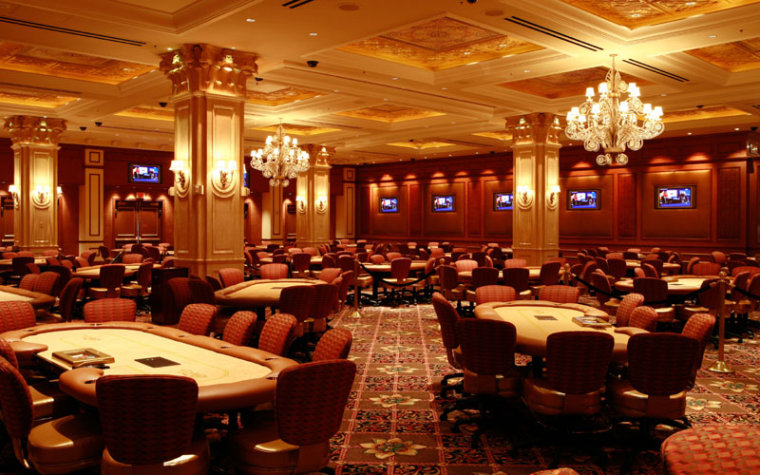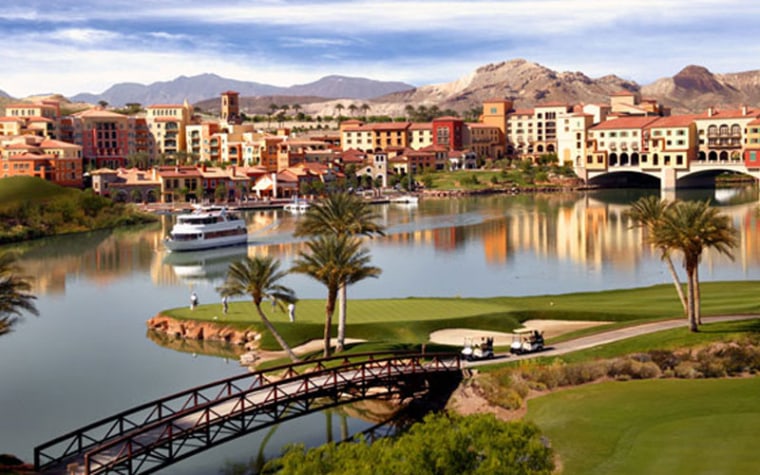You've spent the last seven weeks ping-ponging from a noisy, over-crowded conference hall on the Vegas Strip to a luxury mansion near a championship golf course. You've paid handsomely for the privilege in both cases. If you're good (world-class good) and you're lucky (astronomically lucky), you'll be rewarded with one final grueling day of work, and a $10 million bonus (give or take a few mil) waiting for you if you make it to quitting time.
Welcome to the World Series of Poker.
Last year, tens of thousands of poker players waded through the 110-degree summer heat of Las Vegas to take a crack at cashing in. Almost 9,000 played in the main event alone. That means showing up and putting down $10,000 for a seat card and a very long shot at glory.
This year, despite a downturn in online poker in the U.S. market, coming on the heels of recent banking legislation and high-profile arrests of overseas gaming executives, the expectation is that the field will remain stable—or perhaps just edge down slightly. In fact, the total number of starting contestants in the World Series of Poker Main Event has long been a popular "prop" bet among poker professionals. And this year's discussions about the trend are proving as lively as ever.
"It may be the toughest year since 2003 to predict the size of the field for the Main Event," notes John Caldwell, editor in chief of PokerNews.com. "The legislation has caused the WSOP to have to change some of their rules as far as registration goes. It's going to keep a lot of 'regular Joe' players at home. I think we'll see 5,000 to 5,500 entrants this year, which is still a massive field."
Last year, successfully navigating the huge field of the Main Event earned Hollywood agent Jamie Gold a record $12.5-million prize for 1st place—the richest crown in sports by a wide margin. The 2006 prize pool for the Main Event alone was a whopping $82 million, which, in hindsight, makes the $10,000 entry fee seem like chump change. This year's payouts are a little flatter, meaning that even more players will get a piece of the pie.
Still, the majority of players won't last more than a day in this vaunted competition. For many, the price tag will be somewhere between $1,000 and $2,500 per hour. Most players are happy to pay, and not just the ones who won bargain-priced satellites, or mini-tournaments that award entrance spots in the big show. The good news: No one goes home empty-handed. Feel free to consider how to spend your $15 food court coupon as you shuffle down the long hallway of the Rio after your last chip has been pushed towards some anonymous stranger's stack.
Of course, you don't have to hitch your star to the long odds of the Main Event. You can get an WSOP experience for much less. Scheduled events in the seven-week series start at a measly $1,000 and come in 45 different combinations of price and game-selection. As of last year, the main event isn't even the priciest heat in the series. That title now rests with the $50,000 H.O.R.S.E tournament, which offers five different flavors of poker, while pitting you against 200 or so of the world's top professionals. If you have money to burn and you want to sit down with the world's best in a tournament setting, skip the main event and go straight to H.O.R.S.E. Last year this tournament had 143 entrants, with over $6.8 million in prize money—the first prize of $1.8 million went to Chip Reese after an epic, ten-hour heads up match.
If you'd rather face off against the world's best players without ESPN's cameras recording your every embarrassing miscue, just visit the Bellagio or the Venetian's high-stakes poker rooms. If you flash enough credit at the cage, the Phil Iveys and Doyle Brunsons of the world will be happy to make room for you at their nightly game.
No matter what road to poker glory you choose—$125 super-satellite or $500,000 cash game—you'll need to find accommodations and amenities to suit your endeavor. Poker takes skill, observation, imagination and long hours of stressful mental focus. You can't hope to score big if you're sleeping on your cousin's futon in nearby Henderson.
Online qualifiers and visitors who are just in town for a single tournament, even if it's the Main Event, will likely book a room at a hotel on or near the Las Vegas Strip. You can't beat the value of proximity when 16 to 20-hour days are looming on your horizon. Hotel living isn't for everyone, however.
For poker professionals, many of whom call Las Vegas home (or a second home), there is comfort and convenience aplenty. These pros who aren't full-time Vegas residents have worked and reworked their routines over the decades to provide an optimal environment. For visiting big-name players, especially those who typically compete in events over the entire month-and-a-half series, renting a house is the preferred lifestyle choice.

"My general rule of thumb for staying in hotels is that for one week it is great, and by week two I am starting to get stir crazy and really miss home. I have noticed that my poker playing results are drastically better when I am happy with my living arrangements," says WSOP bracelet-winner Robert Williamson III.
Luckily, Las Vegas's status as a premier destination makes the market for monthly and weekly house rentals fairly liquid. That's not to say there isn't significant lead time required to secure a rental. And unless you're a high-roller, you may need to line up roommates to share that 3,000-square foot house with the pool. If you decide to go the rental route, make sure you're in for the long haul, willing to play cash games if the tournaments don't pan out. Rental homes are not the way to go if you're the kind of player who takes a bad beat and wants to check out, fly home and lick your wounds.
Williamson explains, "I've been leasing a luxury home in Vegas the last few years during the World Series. I not only enjoy the additional space, but also being able to cook in my own kitchen, BBQing outdoors, swimming in privacy, and having a nice glass of wine on one of the balconies. These things help me to relax and prepare mentally for the tough challenge of playing long hours of poker for seven weeks in a row."
The seven-week World Series of Poker starts at Harrah's Rio All-Suite Hotel on June 1 with a $5,000 Mixed Limit/No-Limit Hold 'Em event. The Main Event unfolds from July 6 to July 17. If you're planning on taking your shot this year, get your accommodations squared away soon. And if you're looking for alternate ways to spend $10,000 in Vegas, take a look at the slideshow.
Check back in a couple of weeks for the Forbes Traveler Deluxe Guide to Vegas, featuring insider tips from the regulars: dining, hospitality, entertainment and more.
